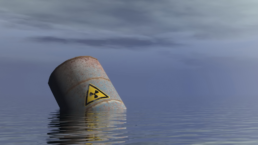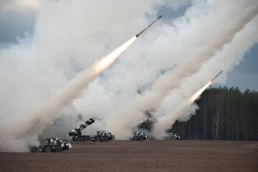By Chris Barncard, University of Wisconsin-Madison News
Russia’s invasion of Ukraine has given the specter of nuclear war renewed weight as a global threat, and a new study of the environmental impact of a nuclear conflict describes dire consequences for the world’s oceans.

“If there were a nuclear war, these huge explosions and the firestorms they cause could throw so much soot — teragrams, or millions of tons — into the atmosphere, it would block out enough sunlight to cool the atmosphere significantly,” says Elizabeth Maroon, a professor of atmospheric and oceanic sciences at the University of Wisconsin–Madison.
In just one month after a nuclear exchange between Russia and the United States or India and Pakistan, average global temperatures would drop by 13 degrees Fahrenheit — a larger temperature change than in the last ice age — according to climate modeling by Maroon and collaborators from around the world. The research team, led by Louisiana State University professor of oceanography and coast sciences Cheryl Harrison, published their findings July 7 in the journal AGU Advances.
Even setting aside radioactive fallout, the consequences on land would be dire, including widespread crop failures. But in just a year, the planet’s interconnected oceans would enter a state unfamiliar to scientists like Maroon who study the way oceans have changed on much longer time scales. And, unlike effects on the atmosphere and on land, oceans would not fully recover within the 30-year time period covered by the researchers’ simulations of nuclear conflicts.
Recent Posts
Mayor Mamdani’s First Day, A Zero Hour Conversation With Richard Wolff
July 2, 2025
Take Action Now If elected, what would Mayor Mamdani do on his first day in City Hall? How would a democratic socialist govern as a big-city mayor?……
The U.S. Is Funding A Bloodbath At Gaza Aid Centers
July 2, 2025
Take Action Now The admin just gave $30M to GHF, the organization at the center of charges that Israel is weaponizing assistance and shooting at…
Feeding The Warfare State
July 1, 2025
Take Action Now We Lose, the Weapons Makers WinBy William D. Hartung, Tom Dispatch The Senate is on the verge of passing the distinctly misnamed…
The Rage Of Billionaires And The Frenzy To Stop Zohran Mamdani From Becoming New York’s Mayor
June 30, 2025
Take Action Now The constellation of forces now regrouping with a vengeance includes titans of Wall Street, enormous real estate interests,…




